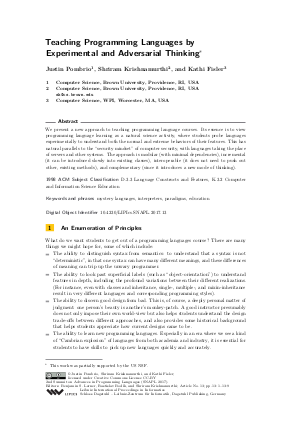Teaching Programming Languages by Experimental and Adversarial Thinking
Authors Justin Pombrio, Shriram Krishnamurthi, Kathi Fisler
-
Part of:
Volume:
2nd Summit on Advances in Programming Languages (SNAPL 2017)
Part of: Series: Leibniz International Proceedings in Informatics (LIPIcs)
Part of: Conference: Summit on Advances in Programming Languages (SNAPL) - License:
 Creative Commons Attribution 3.0 Unported license
Creative Commons Attribution 3.0 Unported license
- Publication Date: 2017-05-05
File

PDF
LIPIcs.SNAPL.2017.13.pdf
- Filesize: 351 kB
- 9 pages
Document Identifiers
Subject Classification
Keywords
- mystery languages
- interpreters
- paradigms
- education
Metrics
- Access Statistics
-
Total Accesses (updated on a weekly basis)
0PDF Downloads0Metadata Views
Abstract
We present a new approach to teaching programming language courses. Its essence is to view programming language learning as a natural science activity, where students probe languages experimentally to understand both the normal and extreme behaviors of their features. This has natural parallels to the "security mindset" of computer security, with languages taking the place of servers and other systems. The approach is modular (with minimal dependencies), incremental (it can be introduced slowly into existing classes), interoperable (it does not need to push out other, existing methods), and complementary (since it introduces a new mode of thinking).
Cite As Get BibTex
Justin Pombrio, Shriram Krishnamurthi, and Kathi Fisler. Teaching Programming Languages by Experimental and Adversarial Thinking. In 2nd Summit on Advances in Programming Languages (SNAPL 2017). Leibniz International Proceedings in Informatics (LIPIcs), Volume 71, pp. 13:1-13:9, Schloss Dagstuhl – Leibniz-Zentrum für Informatik (2017)
https://doi.org/10.4230/LIPIcs.SNAPL.2017.13
BibTex
@InProceedings{pombrio_et_al:LIPIcs.SNAPL.2017.13,
author = {Pombrio, Justin and Krishnamurthi, Shriram and Fisler, Kathi},
title = {{Teaching Programming Languages by Experimental and Adversarial Thinking}},
booktitle = {2nd Summit on Advances in Programming Languages (SNAPL 2017)},
pages = {13:1--13:9},
series = {Leibniz International Proceedings in Informatics (LIPIcs)},
ISBN = {978-3-95977-032-3},
ISSN = {1868-8969},
year = {2017},
volume = {71},
editor = {Lerner, Benjamin S. and Bod{\'\i}k, Rastislav and Krishnamurthi, Shriram},
publisher = {Schloss Dagstuhl -- Leibniz-Zentrum f{\"u}r Informatik},
address = {Dagstuhl, Germany},
URL = {https://drops.dagstuhl.de/entities/document/10.4230/LIPIcs.SNAPL.2017.13},
URN = {urn:nbn:de:0030-drops-71178},
doi = {10.4230/LIPIcs.SNAPL.2017.13},
annote = {Keywords: mystery languages, interpreters, paradigms, education}
}
Author Details
References
-
Harold Abelson and Gerald Jay Sussman. Structure and Interpretation of Computer Programs. MIT Press, 1985.

-
Gregory H. Cooper, Arjun Guha, Shriram Krishnamurthi, Jay McCarthy, and Robert Bruce Findler. Teaching garbage collection without implementing compilers or interpreters. In ACM Technical Symposium on Computer Science Education, 2013.

-
Matthias Felleisen, Robert Bruce Findler, Matthew Flatt, Shriram Krishnamurthi, Eli Barzilay, Jay McCarthy, and Sam Tobin-Hochstadt. The Racket manifesto. In Summit on Advances in Programming Languages, 2015.

-
Daniel P. Friedman, Mitchell Wand, and Christopher T. Haynes. Essentials of Programming Languages. MIT Press.

-
Samuel Kamin. Programming Languages: An Interpreter-Based Approach. Addison-Wesley.

-
Shriram Krishnamurthi. Programming Languages: Application and Interpretation.

-
Shriram Krishnamurthi. Teaching programming languages in a post-Linnaean age. In SIGPLAN Workshop on Undergraduate Programming Language Curricula, 2008. Position paper.

-
John McCarthy. Recursive functions of symbolic expressions and their computation by machine. Communications of the ACM, 3(3), 1960.

-
Robert Sebesta. Concepts of Programming Languages. Addison-Wesley, fifth edition.

